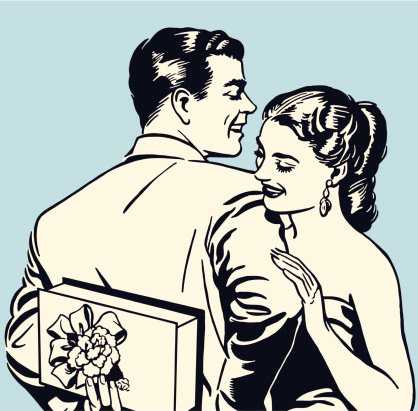MUCH FONT has been spilled over the men’s rights movement (MRM), by both its proponents and its detractors. Various talking points can be found on any MRM-related blog or thread; most of the discussions I’ve encountered center on questions of current rights, laws, and privileges — i.e. custody issues, false rape allegations, college enrollment stats. Here, I want to focus on an argument that is less-discussed, but worthy of thinking about and addressing: the one that claims women have not been historically oppressed. Some go so far as to say that women are, historically, the privileged sex, whereas men have gotten a raw deal.
Up until about two years ago, I unconsciously assumed that women’s disadvantaged status was beyond historical dispute. I knew that I couldn’t have voted had I been born 100 years ago. I knew that girls in feudal society were sold to men once they got their periods. And the four years I spent reading philosophy, religion, and political theory texts in college gave me a special orientation toward the historical view, dating back at least to ancient Greece, of women as creatures incapable of thought and agency. (Nietzsche generously granted that a woman may have “scholarly inclinations,” but only when something is “wrong with her sexuality.” Kant even more generously stated that a woman may be capable of excelling intellectually, but that such success would “exterminate the merits of her sex.” THANKS GUYS.)
So when I was introduced to the work of Karen Straughan (aka GirlWritesWhat), a popular men’s rights activist (MRA) who maintains that women have been historically privileged, I was intrigued.
Developed in Straughan’s video “When female privilege backfires,” the (paraphrased) argument goes: Throughout history, women have been given certain entitlements – namely, provisions, protection, and support – none of which put women in a position to require or deserve the rights that men have had. Men have had rights – to leave the house, to work, to be educated, to be politically engaged, etc. – because they have been given the obligation of providing for, protecting, and supporting women. Female entitlements are privileges; men are stuck with the burden of their obligations, and the rights they have had were not privileges but necessities in order to fulfill their duties — enforced by society, morality, and law — to women (and children).
What I find most interesting about this argument is the overlap between philosopher Simone de Beauvoir’s feminism and Straughan’s men’s rights activism. While the two have similar initial premises, they come to completely different conclusions. Beauvoir offers a different way to think about and respond to the argument of female privilege.
Beauvoir acknowledged that the freedoms of men – political, moral, social, economic, and self-directive – are burdens. Terrifying ones. She also acknowledged that women have had it respectively easy in lots of ways – they’ve been cared for and decided for, with no need to form political or moral consciousness of their own and no requirement to pursue greatness or success. The more choices one has, the more difficult life is. Responsibility for who one is and how one lives is daunting. Historically, women didn’t make the hard choices or take the big risks.
There is a transactional nature to Straughan’s argument asserting female privilege. Men go out into the world; in exchange, women get a home to live in. Men get political rights; in exchange, women get protected and provided for. (And so on.) The crucial assumption here is that provisions, protection, and support are equal in value to, or possibly even greater in value than, the freedoms and rights granted to men.
It was Beauvoir’s existentialist values that prevented her from asserting anything like female privilege. Men have been “the privileged caste,” she says, because transcendence is wherein dignity lies. Transcendence is mobility, agency, responsibility, choosing, going beyond the limits of situation, acting instead of just reacting, forging one’s own way, independence. The MRM’s idea of transactional equality falls through when transcendence is seen as a fundamental human value. Animals can be provided for, protected, and supported; only humans can transcend.
If you don’t believe that transcendence is a fundamental human value – necessary for dignified existence – then this argument will make no sense to you. Straughan claims that women generally don’t value transcendence; in the above-mentioned video, she states that women value safety over freedom, whereas men value freedom over safety. She doesn’t back this claim up (in the video or in other materials of hers I’m familiar with, anyway), but I imagine it might be connected with evolutionary psychology, a can of worms best opened in its own post. But the assertion that things were how they were because women have different values doesn’t take into account the historical conception of women as inferior creatures. How much input did women have in the development of social, moral, religious, and legal structures that limited their freedoms while granting them safety? Did women legislate their historical position? Did women vote not to vote? Choose to be sold as reproductive machines the day after starting their periods and get a cut of the profits? The idea that women chose not to transcend assumes that women were actively involved in constructing the frameworks that have barred them from transcendence historically. As far as I know, they weren’t deemed capable thereof.
Straughan says feminists want rights without responsibilities. I see feminism as the position that transcendence has value, and women should be able to partake of that dimension of human existence. I think it’s extremely important to acknowledge historical contexts and the sometimes-immense burdens that have fallen on men alone (Straughan does a fantastic job of this in her description of modern-day Afghan men’s unjust financial obligations, which I recommend everyone reading this to check out). But the kind of feminism I ascribe to doesn’t want men to maintain historical burdens. Rather, we want a shift in conception wherein both men and women are seen as capable and worthy of transcendence. This way, everyone gets the rights and the freedoms necessary to facilitate a dignified existence, and the obligations and burdens that stem from one sex taking care of and being responsible for the other fall away.


















